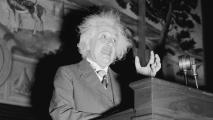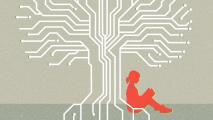Today, most people use smart speakers to listen to music, make shopping lists, or catch up on the news — but tomorrow, the devices could save their lives.
Researchers at the University of Washington (UW) have transformed a smart speaker into a contactless heart rhythm monitor, potentially enabling millions of people to check themselves for irregularities linked to strokes.
“Availability of a low-cost test that can be performed frequently and at the convenience of home can be a game-changer for certain patients in terms of early diagnosis and management,” researcher Arun Sridhar said in a press release.
An Irregular Heartbeat
The average person’s heart beats between 60 and 100 times per minute in a regular rhythm, but every year, about 3 million Americans develop an irregular heartbeat, or “arrhythmia.”
Those people might still have an average heart rate of 60 beats per minute, but their heart might beat slower or faster than normal at different times.
“Heart rhythm disorders are actually more common than some other well-known heart conditions,” Sridhar said. “Cardiac arrhythmias can cause major morbidities such as strokes, but can be highly unpredictable in occurrence, and thus difficult to diagnose.”
Wearables, such as Holter monitors and some smart watches, can detect irregular heartbeats, but the UW team’s heart rhythm monitor is contactless, which might be preferable for some people.
UW’s Heart Rhythm Monitor
The researchers started with an off-the-shelf, seven-microphone array that had the same layout and sensitivity as an Amazon Echo Dot. They enclosed the microphone array in a case along with an off-the-shelf speaker.
They then programmed the speaker to emit a continuous, inaudible sound that would bounce off a person sitting one to two feet away from the speaker.
When the reflected sound enters the speaker’s microphones, an algorithm analyzes the input, honing in on the sound of the person’s heartbeat.
“This is similar to how Alexa can always find my voice even if I’m playing a video or if there are multiple people talking in the room,” researcher Shyam Gollakota said.
“When I say, ‘Hey, Alexa,’ the microphones are working together to find me in the room and listen to what I say next,” he continued. “That’s basically what’s happening here but with the heartbeat.”
This is the future of cardiology.
Arun Sridhar
The researchers tested their contactless heart rhythm monitor on 26 healthy volunteers and 24 hospitalized patients with different cardiac conditions.
When they compared its results to those of a standard heart monitor, there was a small difference, but it “wasn’t medically relevant,” they told the Washington Post.
The team envisions the system being used to spot check for an irregular heartbeat, but they’re interested in seeing if it could possibly monitor heart rhythm continuously, while a person was asleep, for example, which could also help doctors diagnose sleep apnea.
Dr. Smart Speaker
About 25% of Americans now own smart speakers, and the UW team isn’t alone in looking for health-related uses for the devices — others are exploring their potential to diagnose everything from depression to COVID-19 just from the sound of a person’s voice.
UW will need to secure FDA approval for its contactless heart rhythm monitor, but if granted, people could pair it with a smart speaker and conduct non-invasive, at-home screenings of their heart rhythm whenever they want.
“This is the future of cardiology,” Sridhar said. “And the beauty of using these kinds of devices is that they are already in people’s homes.”
We’d love to hear from you! If you have a comment about this article or if you have a tip for a future Freethink story, please email us at [email protected].





